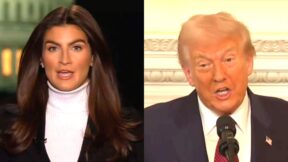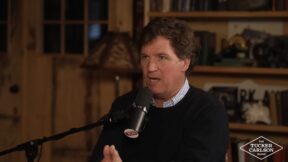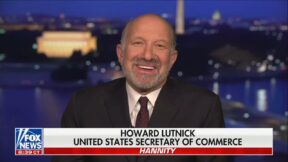‘Royal Edict’: Rand Paul Says Trump ‘Grabbed Up Lots of Executive Power’ for Tariffs, Compares to ‘Kings of England’
Kentucky Republican Sen. Rand Paul told comic and podcast host Russell Brand that President Donald Trump has “grabbed up a lot of executive power” already in his second term, and that ultimately that power grab may be what defines Trump’s legacy.
Paul appeared on Brand’s self-titled podcast for an episode titled “Trump, Tariffs & The Tyranny of Centralized Power” released on Rumble and on X.
Right at the start of the interview, Brand asked Paul whether the Big Beautiful Bill/Act will be what defines Trump’s presidency, or will it instead be the Epstein files controversy, or something else.
“I think if we step back and we look at the Trump administration and Trump in history, the big debate will be over executive power,” Paul said. “And this isn’t a new debate. We had it with the Kings of England. We tried to form a republic where we limited the power of the executive.”
“But Donald Trump has grabbed up a lot of executive power and is operating through emergency,” he said. “So basically, one of the big items I think he will be remembered for is tariffs. But it’s not tariffs being done through Congress, it’s tariffs being done by royal edict or executive edict.”
Paul said the “edicts” are simply Trump “taking up this power,” and that ultimately the courts are likely to put a stop to it.
“I think the court will ultimately rule against him,” he said. “There’s a possibility that the legal rug is is torn out from under them and that there will be a legal prohibition on what he’s doing. That would be extraordinary. I don’t think many people are talking about it.”
He also told Brand that ultimately, the consumer pays for any tariffs, not the American company and not the foreign power at which the tariffs are directed.
“Ultimately, they’re taxes on Americans,” he said.
Later in the podcast, Paul also said that Trump remains the best person to “interrupt the military-industrial complex” and spoke against the “unfairness of the lawfare against Trump,” but when Brand shared a short clip on his X account, that didn’t stop a lot of very negative reactions from the MAGA right to the implications about a Trump power grab.
The subject of Trump’s tariffs also came up in another clip that went viral Sunday, with CNN’s data guru calling him the most influential president of this century and into the last as a result of those policies, and his impact on immigration.
BRAND: Do you think that the Big Beautiful Act, as it is now, is what will come to define Donald Trump’s presidency? Or will it be the Epstein list that, which has, for me, become a kind of synecdoche now rather than an actual list, that means, are you any different from the former administration?
PAUL: I think if we step back and we look at the Trump administration and Trump in history, the big debate will be over executive power. And this isn’t a new debate. We had it with the Kings of England. We tried to form a republic where we limited the power of the executive. But Donald Trump has grabbed up a lot of executive power and is operating through emergency.
So basically, one of the big items I think he will be remembered for is tariffs. But it’s not tariffs being done through Congress, it’s tariffs being done by royal edict or executive edict. And these edicts really aren’t passed by Congress, they’re simply him taking up this power.
It’s working its way through our courts, and we have had one federal court already say that he can’t do it, and we’ll see what happens when it gets to the Supreme Court. He’s using a law that was used to allow him to do sanctions on other countries, he’s using it to create tariffs. But if you look at tariffs, they’re simply a tax. And in our Constitution, we have a very specific rule that says taxes must originate in the House of Representatives, go to the Senate, and then come back and be passed.
The tariffs are never being passed by Congress at all. He’s completely done an end run around Congress. I think the debate over how much power the executive has will be what he’s remembered for. He’s doing it in the hiring and firing, too. So, the Supreme Court and the other courts are upholding his ability to hire and fire, and I think that’s a good thing. On the issue of tariffs I think the court will ultimately rule against him. But i think the entire regime of tariffs that is out there — there’s a possibility that the legal rug is is torn out from under them and that there will be a legal prohibition on what he’s doing. That would be extraordinary. I don’t think many people are talking about it.
[…]
BRAND: On, specifically on the subject of tariffs, do you regard that ultimately then as a tax on American people? Or do you see it as he appears to frame it as an opportunity to cudgel foreign partners and control them in this American authority and power and serve the American people.
PAUL: Without question, tariffs are paid by the American consumer. Even when the business is taxed, the tax of the person bringing it in, most of them, that’s Americans. So Americans make clothing in Vietnam, they make it in China, it comes over here. They’re largely American companies. So if you want to tax cell phones being created in China that Apple makes, you’re taxing an American company.
And the president wants it both ways. He sometimes says, we’re going to punish China. Then he also says, if Tim Cook doesn’t listen to him, he’s going to punish Apple. If they take their phones to India, instead of from China, they make them in India, he’ll punish them also. But then he’s no longer talking about punishing China, he’s talking about him punishing Tim Cook and Apple. Ultimately, they’re taxes on Americans. Without question, they are revenue, they’re brought into the treasury, and the vast majority of them are paid by American companies that are importing these goods into America. And then the consumer pays this because, if I am making coats, ski coats, and they were $55, they’re now gonna be $65 because they cost more to make. I have to pass it on. Everybody passes along taxes to the consumer. So ultimately the consumer will pay for these.
Watch the clip above via Russell Brand on Rumble.




